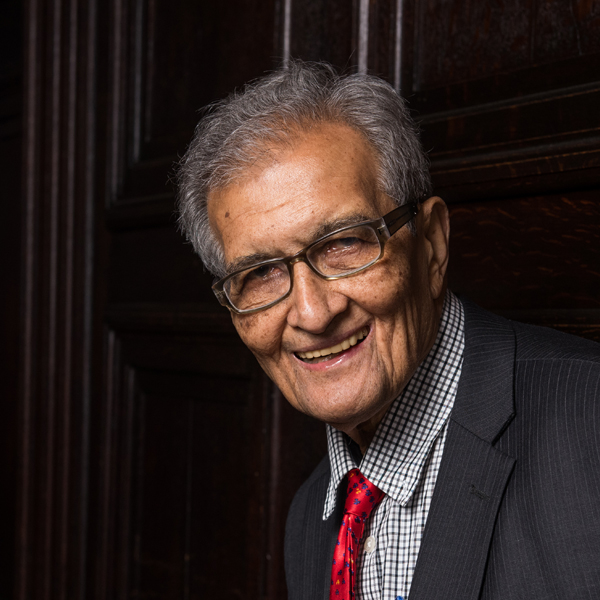Amartya Sen & OPHI
OPHI was set up to explore and advance a multidimensional approach to measures of poverty and wellbeing that was chiefly inspired by the work of the Nobel prize-winning economist and philosopher, Amartya Sen.
The Alkire-Foster method which underpins the majority of OPHI's work builds on the 'Capability Approach', a philosophical framework which Sen articulated to shape the evaluation of poverty and wellbeing. For his contribution to welfare economics, Sen was awarded the Nobel Memorial Prize for Economic Sciences. OPHI is honoured that Sen sits on its Advisory Committee and has spoken at a number of high profile OPHI events.
Rather than income, resources, utility or happiness, Sen proposed that poverty and wellbeing should be considered in terms of people's 'functionings' and 'capabilities'. Sen argued that the objective of development should be the expansion of human capabilities rather than economic growth. Sen's capability approach underpins the United Nations' concept of Human Development, as well as the UNDP's Human Development Reports, and continues to power the international conversation on how to address global inequality and climate change in the 2020s.
Human lives are battered and diminished in all kinds of different ways, and the first task… is to acknowledge that deprivations of very different kinds have to be accommodated within a general overarching framework."
In the Capability Approach, Sen articulated a view of poverty and wellbeing which was intuitively multidimensional rather than unidimensional and of intrinsic value rather than solely based on a person or household's spending power. In Sen's Capability Approach, functionings refer to the 'beings' and 'doings' that people both value and have reason to value, such as attending school, or accessing medical services. Capabilities are real freedoms to achieve those functionings. Rather than simply exchange the measurement of money with the measurement of resources (such as owning a bike, or a refrigerator), Sen challenged economists to measure valuable human functionings, such as being able to move around, or being able to live a long and healthy life.
Measurement based on values opened up a space for the participation of the people whose lives are being assessed. A value-driven approach would also recognise that not all people will flourish in the same way with the same resource, for example the same quantity of food may meet the needs of - and be valued by - a young child, but not by an agricultural labourer or pregnant woman.
By supporting capabilities, Sen also pointed out that an exclusive focus on meeting needs for survival does not provide room for choice. He argued that human freedoms can be defined in part as the ability to shape one's own life.
The Good Life is partly a life of genuine choice, not one in which the person is forced into a particular life, however rich it might be in other respects.
In practice, the purpose of the Capability Approach opens a door to measurement that puts human flourishing and freedoms at the centre.
Learn more
- Multidimensional Poverty Measurement and Analysis (2015)
- How to Build a National Multidimensional Poverty Index (MPI): Using the MPI to inform the SDGs (2019)
- Introduction to the Capability Approach (video)
- Capability Approach and MPI (video)
- Amartya Sen's lectures for OPHI (including 'Hunger and Public Action', 2019; 'Collective Choice and Social Welfare', 2017; 'The Discovery of Women', 2013; 'The Pursuit of Justice', 2009; OPHI's 2007 launch)
- Sen, A. (1979). 'Equality of What?' The Tanner Lecture on Human Values
Selected works by Sen
- Inequality Re-Examined (1992)
- Development as Freedom (1999)
- Rationality and Freedom (2002)
- Identity and Violence: The Illusion of Destiny (2006)
- The Idea of Justice (2009)
- Collective Choice and Social Welfare (2016)



